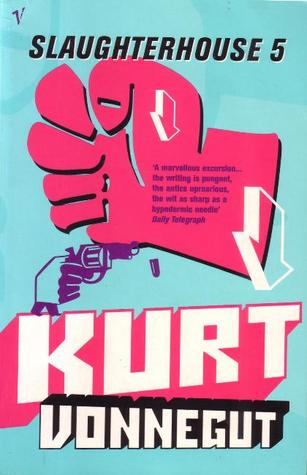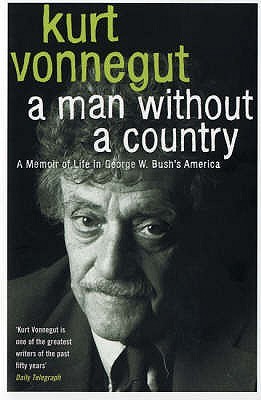Kurt Vonnegut’s Slaughterhouse 5 is seen as his best work and a modern classic although, having completed it, I’m left wondering why. Blending science fiction with his memoirs Vonnegut has created a meta-fictional novel where time travel is a primary plot device; one that allows him the freedom to dismiss chronology in the telling of his tale.
Billy Pilgrim is a war veteran, having been a prisoner of war in a converted abattoir in Dresden. Years after the war he is involved in a plane crash which causes him to become “unstuck in time”; a strange condition that allows him to travel to any point in his life, or even to the planet Tralfamadore where the aliens that live there view life as a single representation of every moment. Through his frequent travels in time, Billy Pilgrim gets to relive many points of his life such as Dresden, his marriage, and even his death; all of these combine to show Billy’s attempt at making sense of the world, his fatalist conclusions permeating the novel.
The story of Billy Pilgrim doesn’t start until the second chapter, the first, instead, being the author’s apology for the novel’s mess (although he states you can’t make sense of a massacre) and how, in his mind, the book came to be. The prose is minimalist and repetitive. Phrases appear regularly or statements reappear reworded. The use of “so it goes” whenever something dies, be it a person or bubbles in champagne, is understandable, however, in its need to demonstrate death as something routine and cheap, it does become grating.
There are many characters in Slaughterhouse 5 although I don’t feel that any of them were given much depth. People appear for a paragraph and then Billy Pilgrim is off on his travels before you have a chance to get to know them. Even Billy failed to hold my attention, possibly because we fail to really get to know him. The author spends time telling us about him rather than showing him doing anything which, I feel, cheapens the experience. His condition, that of being “unstuck in time”, leaves a nice ambiguity about the novel although it’s highly probable that his travelling is a delusional passage between memories brought on by the trauma of witnessing the bombing of Dresden.
Maybe the book is a product of its time or maybe there’s something I’m missing but Slaughterhouse 5 is not a novel I’d recommend. Having no experience of Vonnegut’s other work I can’t say whether this book, being part memoir, is a typical example of his canon. While the novel is understandably a mess, I can’t help but feel that the prose and characterisation are lacking and what, on paper, sounds like a great idea has been put through a literary slaughterhouse. So it goes.


Dear Stewart,
While I agree nearly a hundred percent with all the reviews of the books that I have read and I find here, I was horrified to see that you did not enjoy Slaughterhouse 5. I remember reading it a few years ago and laughing like hell. Although his other books are not quite up there, Slaughterhouse, to borrow a phrase from Malamud, has a comedy tinged in the wine of sadness.
It was late 2005 (which is when this review actually dates to) that I read the book and I just wasn’t able to connect with Vonnegut’s style. I daresay my reading tastes have changed much since then and in reading world literature my mind has been opened up to all manner of styles – dry, comedic, playful, verbose, bewildering – that I may appreciate Slaughterhouse Five on a second outing. I’m in no hurry to return, though, but I do have Vonnegut’s Cat’s Cradle on my shelves, which I may bump up the list.
Yeah, Cat’s Cradle, I am told is what cemented his reputation. But with Vonnegut the problem is either it holds you by the collar or it doesn’t. In my case, it almost always does, but he tends to become repetitive and obsessed with the Vietnam War, as you read more than a few books.
I would like to know how you found Cat’s Cradle, whenever you read it, for to my mind you are a discerning reader.
Have you tried reading Roberto Bolano, Borges, or Cortazar… they are each in their own way, an experience… or
I’ve acquired more than I’ve read. One my shelves I’ve got Distant Star, Last Evenings On Earth, The Savage Detectives and 2666 by Bolano; Labyrinths by Borges, and Hopscotch and The Diary of Andrés Fava by Cortazar. They are all on my list of intended visits at some point this year…but then so are so many others. Borges I’ve dipped in and out of, but it’s been a while.
Where would you recommend starting with them?
Start with Bolano, Distant Star and Last Evenings on Earth will be over in a blink… Borges and Cortazar demand time and many readings, though you know you are amidst something extraordinary right at the start.
I have read the others by Bolano and am half way with 2666, and it is virtually reading itself out.
I started on 2666 at the start of January, with the intention of interspersing the separate parts with other books. Reading large books takes me forever, which is why I rarely get around to them: far too many other small treats to work through. As far as 2666, I thoroughly enjoyed The Part About The Critics, but haven’t returned to it since. I’ll probably need to start again, when the time comes. But I’m thinking it may be best to build up an appreciation for Bolano through the smaller works first. Supposedly, in some ways, they all point towards 2666.
Well-written review but I disagree with your conclusion. I found “Slaughterhouse 5” to be a work of genius, literature that inspired me to write. Maybe it comes down to a question of taste. So it goes 🙂
Thanks, Mohamed. I actually wrote the review way back around 2005 and I don’t doubt that, were I to give it a second go, I’d look on it more favourably. In retrospect, I may have been more disoriented by the structure of the novel than I would be today, having now a number of postmodern texts under my belt.